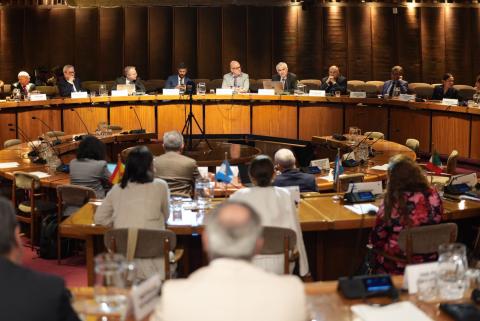Announcement
In 2024, the members of the Regional Expert Group on Water Resources for Latin America and the Caribbean (LAC) have driven various activities that contribute to accelerating the achievement of SDG 6 and further support the implementation of the Regional Water Action Agenda. Below are further details:
March 2024: IV Edition of the Regional Water Dialogues for Latin America and the Caribbean.
From March 11 to 13, 2024, the IV Edition of the Regional Water Dialogues for Latin America and the Caribbean was held in San José, Costa Rica, organized by the Economic Commission for Latin America and the Caribbean (ECLAC) in collaboration with the Inter-American Institute for Cooperation on Agriculture (IICA).
The Regional Water Dialogues provided a high-level ministerial platform for multistakeholder exchanges to promote best practices and advance the achievement of SDG 6 in the region. This fourth edition saw the participation of ministers, vice ministers, and senior officials from Brazil, Bolivia, Chile, Colombia, Costa Rica, El Salvador, Guatemala, Honduras, Jamaica, Mexico, Nicaragua, Panama, Peru, the Dominican Republic, and Uruguay, as well as civil society, academia, and private sector representatives, totaling over 150 in-person attendees, of which 39% were women and 61% men. Additionally, 82 panelists attended, with 37% women and 63% men. The event also saw 1,870 virtual participants from over 57 countries, with 48% women and 51% men, predominantly from the public sector, academia, and private industry.
Supported by the Regional Expert Group on Water Resources, the Dialogues were structured around eight sessions aimed at identifying solutions to accelerate the achievement of SDG 6 in LAC. The results of these sessions align with the voluntary commitments made within the framework of the Regional Water Action Agenda adopted by countries in 2023, a collaborative roadmap to gather lessons learned for achieving a sustainable and inclusive water transition in the region.
April 2024: Americas Regional Process.
This event highlighted the collaboration between several members of the regional expert group: the IDB, GWP, PHI-UNESCO, and the OAS. The Americas Regional Process, coordinated by the IDB within the context of the 10th World Water Forum, brought together key actors, such as politicians, multilateral institutions, academia, civil society, and the private sector, to raise awareness, foster political commitment, and spur action on global water issues.
The regional process allowed LAC to present a unified voice at the forum through subregional reports on water and sanitation. ECLAC, through its Natural Resources Division, consolidated the information and produced the “Regional Report for the Americas,” based on reports from 48 countries, in-person and hybrid workshops, and local initiatives. Three key conclusions emerged:
- The need for investment in the water sector with robust governance.
- The significance of water as an indicator of climate change and the promotion of inclusive green growth in LAC.
- The importance of innovation for a sustainable water transition.
The Natural Resources Division of ECLAC was invited to participate in the discussion panel organized by the World Bank and AIDIS on the challenges and guidelines for achieving SDG 6. The panel brought together experts and leaders from the water sector to analyze strategies and policies aimed at addressing the existing gaps in meeting this important global goal.
May 2024: Seminar on Nature-Based Solutions to Increase Water Availability in Agriculture.
The second joint seminar of the ROSA Project, organized by the Regional Water Network, was held in a hybrid format. During the event, participating countries analyzed opportunities to implement Nature-Based Solutions (NbS) aimed at improving water availability in agriculture. Success stories and lessons learned were shared, focusing on ecosystem-based approaches to enhance food production sustainability, water management, and climate change adaptation. ECLAC promoted knowledge exchange and best practices among participants from various countries in the region. The event also included valuable participation from FAO, IICA, and IWA. Furthermore, the seminar disseminated a study that ECLAC is developing on NbS and encouraged the sharing of experiences among the attending countries.
August 2024: IWA 2024 Congress: Advocating for Circular Economy in Water Management.
From August 11 to 15, 2024, ECLAC participated in the prestigious IWA World Water Congress held in Toronto, Canada. This global event, renowned for promoting debates and exchanges on water management and policies, brought together prominent professionals, researchers, and decision-makers from diverse sectors. ECLAC delivered a presentation on integrating circular economy principles into water management systems in Latin America and the Caribbean, focusing on wastewater treatment, methane recovery, water reuse, and sustainable infrastructure.
September 2024: Water Governance Congress: “Access to Water, a Human Right”.
This hybrid event was held at the National University of Agriculture and Livestock (UNAG) in Catacamas, Olancho, with ECLAC delivering a keynote speech in a parallel high-level activity of CCAD/SICA: “Exchange of International Experiences in Water Resource Management.” The event also featured GWP's participation.
October 2024: 10th Water Dialogues Spain-LAC.
At the 10th Water Dialogues Spain-LAC, organized by CAF, innovative solutions for addressing climate change challenges in urban water management were discussed. ECLAC presented evidence on the opportunities of the circular economy in wastewater treatment in Latin America and the Caribbean, with a focus on methane recovery and electricity generation in small and medium-capacity plants.
November 2024: Ibero-American Water Directors Conference (CODIA) and PHI-UNESCO Meeting.
ECLAC participated in the XVI Meeting of National Committees and Focal Points of UNESCO’s Intergovernmental Hydrological Program for Latin America and the Caribbean (PHI-LAC) and the XXV Conference of Ibero-American Water Directors and Authorities (CODIA), held in Puntarenas, Costa Rica. Topics discussed included early warning systems for extreme hydrometeorological events, water use efficiency, water quality, planning and IWRM, and strengthening cross-sectoral collaboration between water and meteorology.
November 2024: 3rd International Symposium on Transboundary Waters in Latin America and the Caribbean.
Held from November 19 to 20, 2024, in San Salvador, El Salvador, the 3rd International Symposium on Transboundary Waters in Latin America and the Caribbean addressed the importance of managing shared water resources as a key element for regional development, especially in the context of the climate crisis. The aim was to promote cooperation among countries in the region to ensure inclusive, resilient, and equitable water management that protects ecosystems and guarantees access to water. Organized by the Trinational Commission of the Trifinio Plan (CTPT), the General Secretariat of the Organization of American States (OAS), and the Inter-American Development Bank (IDB), the event brought together government leaders, experts, academics, and civil society representatives to discuss regulatory frameworks, water security, climate risks, and share best practices to strengthen cooperation in basin and aquifer management.
November 2024: OPS and AIDIS Symposium: “Water, Sanitation, and Hygiene, Health, and Equity: Key Elements for Achieving the 2030 Agenda”
Under the framework of the UN 2030 Agenda, this symposium, organized by the Pan American Health Organization (PAHO) and the Inter-American Association of Sanitary and Environmental Engineering (AIDIS), examined the progress and challenges in achieving SDG 6 and its targets in Latin America and the Caribbean (LAC). Topics discussed included governance, human resource availability, regulation, monitoring, and financing necessary to ensure equitable and sustainable access to water, sanitation, and hygiene (WASH). Successful experiences in the region were highlighted, with an emphasis on inequities excluding certain population groups from public sector policies. In line with the “leave no one behind” principle, the symposium aimed to generate evidence to help Member States mobilize efforts, implement concrete actions, and guarantee equity and affordability in access to these essential services, promoting the achievement of the objectives set out in the 2030 Agenda.
November 2024: Training on “Hydrological Monitoring Networks and Ecological Flow Monitoring” for the Plurinational State of Bolivia.
As part of the ROSA project, a virtual training on “Hydrological Monitoring Networks and Ecological Flow Monitoring” was held with support from UNESCO and CEREGAS. The event aimed to strengthen the Plurinational State of Bolivia's capacity in designing, implementing, and managing hydrological monitoring networks, also integrating environmental flow monitoring. This was achieved through the presentation and analysis of concrete experiences and best practices, offering perspectives from experts and other countries’ experiences.
December 2024: Fifth Meeting of the Regional Expert Group on Water Resources in Latin America and the Caribbean.
The meeting focused on collaborative efforts in water resource management, discussing key topics such as the upcoming Regional Water Dialogues for 2025 and the ROSA project.
December 2024: Seminar on “Water Security: Governance, Economic Development, and Finance”.
ECLAC participated in the seminar titled “Water Security: Governance, Economic Development, and Finance,” organized by IWA, highlighting how extreme phenomena and pollution affect water resources in Latin America and the Caribbean.
December 2024: Online Training: “The Water Convention - A Tool to Improve Transboundary Water Management” for the Plurinational State of Bolivia.
As part of the ROSA project, a virtual training on “The Water Convention - A Tool to Improve Transboundary Water Management” was held with support from the Secretariat of the Water Convention at UNECE. The event aimed to address its objectives, functioning, and benefits for countries adhering to it.
IUCN
In 2024, IUCN, through the BRIDGE program, played a key role in promoting water governance and transboundary cooperation in South America, focusing on the sustainable management of shared water resources. This year, IUCN strengthened key institutions such as the Ecuador-Peru Binational IWRM Commission and the Binational Authority of Lake Titicaca, advancing water diplomacy, the inclusion of women and youth in decision-making, and promoting financial sustainability in transboundary basins. Key milestones included the organization of the Second Forum of Women Water Guardians, a seminar on climate change adaptation in transboundary basins, and participation in international events such as World Water Week, COP 26, and the 4th South American Conservation Forum. Additionally, IUCN provided specialized training to officials from Bolivia, Ecuador, Peru, and Colombia through advanced courses in water governance, consolidating a regional network committed to sustainable water resource management. IUCN's activities in 2024 have been crucial in strengthening regional cooperation and promoting blue peace, contributing to the SDGs, particularly SDG 6.5 on Integrated Water Resources Management.



